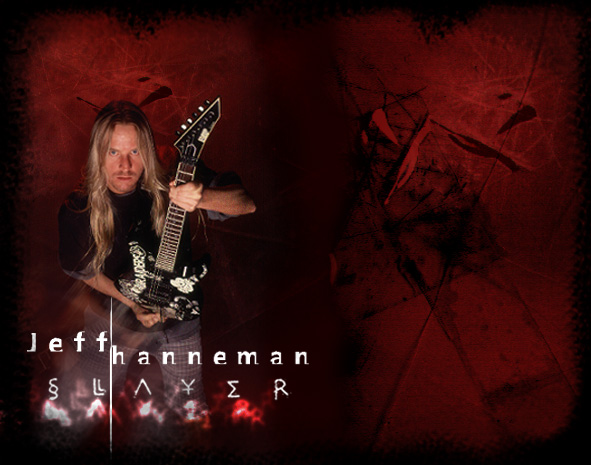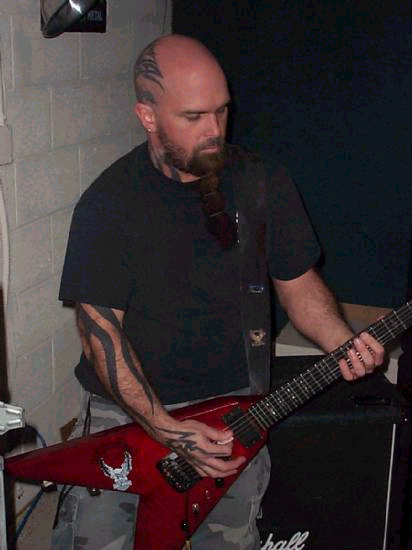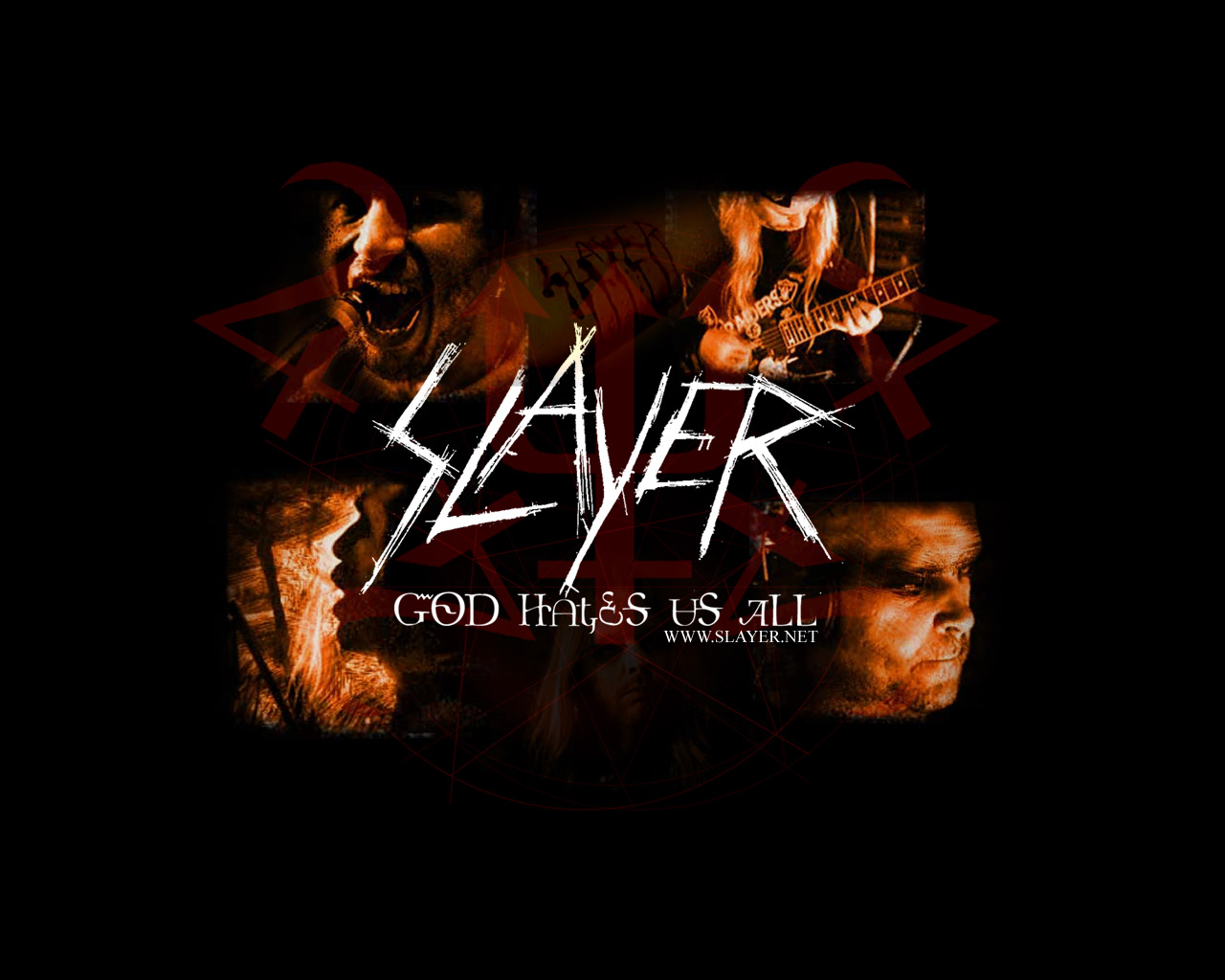|
|
 |
|
|
Slayer-Slayer-Slayer-Slayer |
|
 |
|
 Artist Profile: Artist Profile:
Slayer
Slayer was one of the most distinctive, influential, and extreme thrash-metal bands of the
1980s. Their graphic lyrics deal with everything from death and dismemberment to war and the horrors of hell. Their full-throttle
velocity, wildly chaotic guitar solos, and powerful musical chops paint an effectively chilling sonic background for their
obsessive chronicling of the dark side; this correspondence has helped Slayer's music hold up arguably better than the remaining
Big Three '80s thrash outfits (Metallica, Megadeth, Anthrax). Naturally, Slayer has stirred up quite a bit of controversy
over the years, with rumors flying about Satanism and Nazism that have only added to their mystique. Over the years, Slayer
has put out some high-quality albums, one undisputed classic (Reign in Blood), and seen the numbers of naysayers and detractors
shrinking as their impact on the growing death metal movement was gradually and respectfully acknowledged. Slayer has survived
into the 1990s with arguably the most vitality and the least compromise of any pre-Nirvana metal band, and their intensity
still inspires similar responses from their devoted fans.
Slayer was formed in 1982 in Huntington Beach, California by guitarists Kerry King and Jeff Hanneman;
also recruited were bassist/vocalist Tom Araya and drummer Dave Lombardo. The band started out playing covers of Judas Priest
and Iron Maiden songs, but quickly discovered that they could get attention (and fans) by exploiting threatening, Satanic
imagery. The band was invited by Metal Blade's Brian Slagel to contribute a track to the Metal Massacre III compilation (a
series which also saw the vinyl debuts of Metallica and Voivod); a contract and debut album, Show No Mercy, followed shortly
thereafter. While Slayer's early approach was rather cartoonish, their breakneck speed and instrumental prowess were still
highly evident. Two EPs, Haunting the Chapel and Live Undead, were released in 1984, but 1985's Hell Awaits refined their
lyrical obsessions into a sort of concept album about damnation and torture and made an immediate sensation in heavy metal
circles, winning Slayer a rabid cult following. Def Jam's co-founder Rick Rubin took a liking to the band, signed them to
his label, and contributed the first clear-sounding production heard on any Slayer album for the stripped-down Reign in Blood.
Due to the graphic nature of the material, CBS refused to distribute the album, which garnered a great deal of publicity for
the band; eventually, Geffen Records stepped in. Combining Slayer's trademark speed-metal with the tempos and song lengths
(if not structures) of hardcore, along with the band's most disturbing lyrics yet, Reign in Blood was an instant classic,
breaking the band through to a wider audience, and was hailed by some as the greatest speed-metal album of all time (some
give the nod to Metallica's Master of Puppets).
South of Heaven disappointed some of the band's hardcore followers, as Slayer successfully broke out
of the potential stylistic straitjacket of their reputation as the world's fastest, most extreme band. Drummer Lombardo took
some time off and was briefly replaced by Whiplash drummer Tony Scaglione, but soon returned to the fold. 1990's Seasons in
the Abyss was well-received in all respects, incorporating more of the classic Slayer intensity into a more commercial --
but no less uncompromising -- sound. "War Ensemble" and the title track became favorites on MTV's Headbanger's Ball, and Slayer
consolidated its position at the forefront of thrash, along with Metallica. Following the release of the double live album
Decade of Aggression, Lombardo left the band for good due to personality conflicts with the other members and formed Grip
Inc. Slayer remained quiet for a few years; the only new material released after 1990 was a duet with Ice-T recorded for the
Judgment Night soundtrack on a medley of songs by the Exploited. After leaving his group the Forbidden, Paul Bostaph signed
on as the new drummer for 1994's Divine Intervention, which was released to glowing reviews; thanks to the new death metal
movement, which drew upon Slayer and particularly Reign in Blood for its inspiration, Slayer were hailed as metal innovators.
The album was a massive success, debuting at number eight on the Billboard album charts. Bostaph left the band to concentrate
on a side project, the Truth About Seafood, and was replaced by ex-Testament drummer Jon Dette for Undisputed Attitude, an
album consisting mostly of punk and hardcore covers. Bostaph rejoined Slayer in time to record 1998's Diabolus in Musica.
~ Steve Huey, All Music Guide
|
 |
|
|
 |
|
|
 |
|
|
|
|
God Hates Us All
"We definitely made our own road
and there's not too
many people driving
down our road. Nobody's doing it."
Coming from anyone else,
this might sound like an idle boast. When guitarist Kerry King of Slayer says it; it's a simple statement of fact. Almost
20 years after Slayer first started blending the heavy riffs of metal with the anger and violence of punk, the next chapter
in the Slayer story will be written with the release of GOD HATES US ALL. It's been three years since Slayer last released
a record, 1998's DIABOLUS IN MUSICA, but it's not like the guys have been lounging around poolside, sipping mai-tais
and waiting for the royalty checks to roll in. "We started working on this record after we got done with a long touring cycle,
but prior to Ozzfest '99," says guitarist Jeff Hanneman. "And like every three or four months, something would come up to
sidetrack us so we couldnt finish it. We'd have to take a break and learn stuff for Ozzfest and come back, work for a few
months, go in and do a WCW song for a month (Here Comes The Pain), go out on the Tattoo the Earth tour, last summer. Then
we'd work for a few more months until we were asked to do a song "Bloodline" for the Dracula 2000 soundtrack, and that was
the last break. Then we got our shit together, went up to Vancouver and made a record."
Recorded
at The Warehouse, a Vancouver studio owned by Bryan Adams, certain alterations had to be made in converting Slayers new environs
from a studio owned by a lightweight Canadian pop singer to something suitable for four men recording a 12-14-song album titled
GOD HATES US ALL. Slight alterations, like a chalked-out crime-scene-style drawing of a body on the floor. Candles.
Dimmed lights. Incense. Porn-covered walls. All the little amenities that make a house a home.
"We
had two banner flags that were of middle fingers," says singer/bassist Tom Araya. "As you walked into the first door of the
studio, there was a Misfits skull that said, Eat a bag. The next door you opened, there was a white flag with a middle finger
pointed up right in your face. You'd open the door to the mixing room, theres another middle finger. That was basically the
attitude of Slayer in the studio. We had a red devil head on one of the speakers. We had a skull on another. That_s the kind
of shit we put up. Spooky stuff that makes you feel at home."
Slayer picked Matt Hyde
to produce GOD HATES US ALL, after his stellar work on "Bloodline" for the Dracula 2000 soundtrack. "He had a handle
on every aspect of the recording. He likes the band, he likes the music," says King. "He knew what we were trying to achieve,
rather than just us telling him. He knew what was going on. I tell people he's God, might as well bring in the cross and nail
him up to it because hes the fucking best."
As intense a record as Slayer has recorded,
God Hates Us All found King and Hanneman stripping the songwriting down to the essentials, trimming the fat and keeping the
fury. "I didnt write the usual Dungeons and Dragons shit, looking in the synonym finder for words I have no idea what they
mean anyway, " King says by way of explanation. "This is a lot more how I talk, a lot more street. A lot of the topics are
things people can relate to and they_ll hear the street-style version, so I think they_ll get more out of it."
Youd
have to be deaf, dumb or dead to miss the message of songs like "Threshold" or "Exile", which crackle with the unchecked wrath
Slayer, fans have come to count on. "Threshold" is about reaching your limit in any given aspect, with a person in a situation
where youre about to break. You're about to blow-up," says King. Exile is pretty much about a person - everybody's got one
- who is like the anti-them -- you just hate with every ounce of your fucking being. It_s called "Exile" because you want
them away from you. You want to kill yourself so you don't have to deal with them anymore."
King
and Hanneman toyed with new guitar tunings on the album, taking the plunge down to Drop B a couple times and hauling out a
seven-string axe for the first time in Slayer history. "A lot of people you see in Guitar World say, "I'm not Steve Vai, I
have no reason to play a seven-string," says King. "That's like telling a drummer to play a single kick drum, trying to tell
him he doesn't need a double-bass kick. It doesn't make sense. Or they cop out saying, I'm not that good. You dont have to
be good to make up a seven-string riff."
Slayer records begin with the drums, and Paul
Bostaph, timekeeper for half of Slayer's nearly 20 years as a band, says there's a simple rule he follows in setting the brutal
pace. "Rick Rubin once said the perfect take is the one that felt like it was going to fall apart but never did. I thought
that was one of the wisest things I've ever heard and I always try to go for that."
During
breaks from recording, Slayer hits the town, patronizing local bars like the Shark Club and the Cobalt Club and watching nearly
every hockey game the hometown Vancouver Canucks played. Singer Tom Araya spent his off-hours reading true crime novels with
cheery titles along the lines of "Happy Like Murderers" to help him inhabit the minds of murderous priests ("God Send Death")
and a fallen angel pushing drugs ("Cast Down"). "I use those books to spark my imagination, to go into the role playing that
I need in order to sound convincing. I need to sing and make it sound like I'm actually going to do these things I'm saying.
They help out a lot with the screaming."
Let other bands break-up, try to "find their
sound" or record albums with symphonies. In the fickle, ever-changing world of music, Slayer remains a sure thing. "I think
I'm a fan first and foremost," says King. "The difference between me and the people watching our show is that I learned how
to play guitar. For some reason, I know how to make up riffs for Slayer and I get the opportunity to do that, so I'm like
the superfan. Its what I'm into. If I was going to start a new band today, Id want it to be just like this one."
|  © 2001 Slayer. All rights reserved. © 2001 Slayer. All rights reserved.



|
|
|
 |

